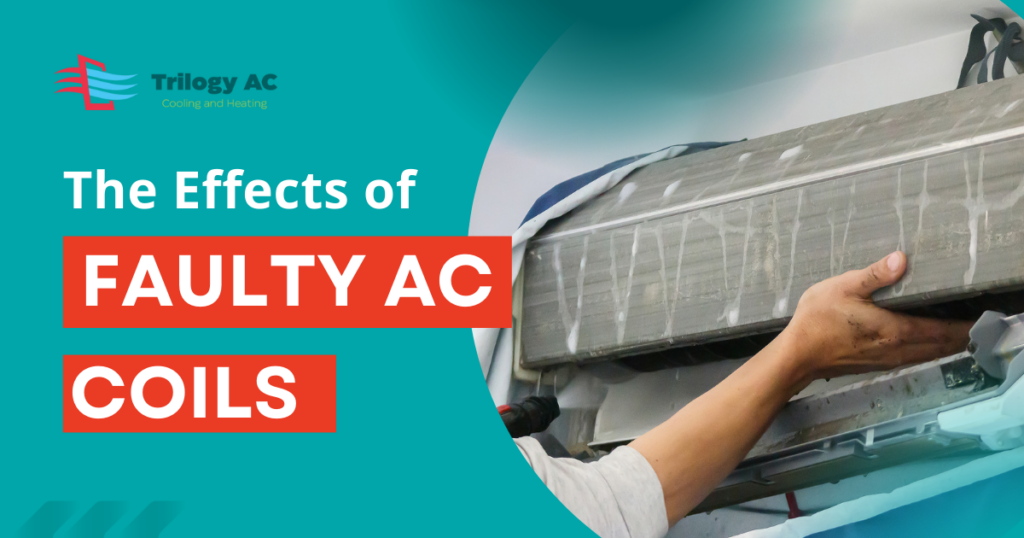Faulty or dirty AC coils can cause your air conditioner to work harder. If not fixed, the problem can lead to a frozen evaporator coil, high electricity bills, or a burnt-out compressor. Promptly calling a local air conditioning services company can avoid the most costly repairs or replacing the system years ahead of schedule.
To help you understand the consequences of faulty AC coils, we’ll explain how these vital parts of your HVAC system work and list the common effects of coil problems.
How Do AC Coils Work?
The evaporator and condenser coils are part of a complex system that includes indoor and outdoor components. As the refrigerant passes through the evaporator coil, it absorbs heat from the air blown over it. The heated coolant flows toward the outdoor unit where a fan helps release heat from the condenser coil. The cooled refrigerant is pumped back in, cooling the air around it, and a blower pushes this air through ducts to each room in your home.
The conversion of refrigerant from a liquid to a gas and back also aids the cooling process. But in addition to the coils, your AC system contains numerous other parts and components. None of these can work properly with a faulty coil. While AC coils are made of durable copper, they can get dirty, making it hard to release heat, and can be damaged by the elements. They must be properly cleaned and maintained; failing to do so can lead to various unwanted effects.
What Happens If I Have a Faulty AC Coil?
If you have a dirty, leaking, or damaged AC coil, here are some issues that may occur:
Frozen Evaporator Coil
An evaporator coil typically freezes due to restricted airflow. The cause can be easy to resolve; changing a dirty air filter, clearing a clogged drain, or opening closed registers in your home can improve airflow and stop the coil from freezing up. If it’s an isolated incident, turning the system off for a few hours or running it in fan mode can melt the ice.
However, if a stubborn layer of dirt is preventing heat transfer and causing a frozen evaporator coil, you’ll need a professional to address the situation. Chipping the ice away or brushing dirt rigorously can cause more damage. The dirt and a film of ice insulate the refrigerant, so your house will be unusually warm; a professional can clean the coil and fix the underlying problem.
Refrigerant Leak
A refrigerant leak can also cause an evaporator coil to become icy. It can originate from a broken coil, and when enough refrigerant seeps out, the cooling capacity of your AC system decreases. There’s less coolant to absorb and release heat, so the coil becomes colder until condensation freezes on its outer surface. A refrigerant leak reduces system efficiency and is an immediate health and environmental risk.
Health Symptoms
Refrigerant is a toxic substance that can make you very sick. Whether touched or inhaled, it can trigger a range of symptoms. Signs of exposure include:
- Burning sensation on the skin
- Coughing
- Sore throat
- Shortness of breath
- Runny nose
- Eye irritation
- Nausea
- Headache
- Dizziness
Reduced Energy Efficiency
A dirty or damaged evaporator coil causes an air conditioner to run inefficiently. The unit must work harder to compensate for the deficit in heat transfer. Assuming other components are working normally, the AC will run longer to maintain a comfortable temperature. The extra strain can damage the system, but before then, you may see higher monthly energy bills; the increase can be gradual or sudden.
If your local utility rates haven’t increased, contact an AC technician. A faulty AC coil can have various long-term effects if not repaired. It increases wear and tear on other components, further increasing operating costs beyond paying more for electricity.
Unusual Noises
Air conditioners are engineered to run relatively quietly. However, a broken evaporator coil can result in noises you ordinarily wouldn’t hear. These include hissing or gurgling sounds, which can mean refrigerant is escaping from a copper line. Banging noises can mean the coil is loose and hitting other components.
Reduced Cooling Capacity
If your air conditioner is cooling your home less effectively or is blowing warm air, check for issues such as a frozen evaporator coil. The refrigerant in the coil removes heat from the air inside and releases it outside. If the coil isn’t functioning properly or the refrigerant is leaking, the problem can diminish the system’s cooling ability.
Short Cycling
An evaporator coil issue can cause your air conditioner to turn on and off more frequently. This happens because the coil can’t absorb enough heat for the system to maintain the thermostat setting. Short cycling can be annoying but also wastes energy. The constant turning on and off of the system accelerates wear and tear. If the problem isn’t fixed, major components can fail prematurely, resulting in complex, expensive repairs.
Leaks from the Unit
When you have a faulty AC coil, you may notice a puddle of liquid under the unit. It could be there’s a frozen evaporator coil and melting water is accumulating below it. Or, the refrigerant could be leaking and pooling up. Either way, the problem can cause serious damage to your AC if it’s not fixed immediately. Therefore, call an HVAC company right away if your air conditioner is leaking.
Increased Indoor Humidity
A dirty or frozen evaporator coil prevents an AC from removing moisture from the air. If your home is warmer and more humid, yet the system is running, check whether the coil is frosted over or damaged. Icy coils can be thawed out. But if they continue to freeze over and humidity problems persist, call a professional to check the system and make any necessary repairs.
Foul, Exhaust-Like Odor
Air conditioning refrigerant can have a sweet, pungent smell or a foul odor similar to chloroform. Freon can be toxic so call for help right away. However, the newer R-410A refrigerant does not have an odor, so you can’t detect the problem by smell. It is also non-toxic. Other AC odors of concern include a musty odor, which can indicate mold is growing in the unit, or a burning odor that can signal a wiring, fan motor, or compressor problem.
What Causes a Faulty AC Coil?
A refrigerant leak or other coil problem can be caused by wear and tear, which is why older coils are more prone to problems. Corrosion, vibrations, and accidental impacts can also damage an AC coil. Poor filtration can expose it to contaminants that eventually wear it out. If your AC unit isn’t properly sized, it can cool your home too quickly or short cycle, which can lead to humidity problems that cause a frozen evaporator coil.
How Long Do AC Coils Last?
An evaporator coil can theoretically last up to 20 years if properly maintained. A condenser coil typically lasts 10 to 15 years. Usually, AC coils last for the life of the system. A professional can replace them and get the system working again, but if the evaporator and condenser coil are mismatched, energy efficiency will decrease and costly repairs may be needed later.
Can I Fix a Faulty Air Conditioner Coil?
If it’s an isolated occurrence, you can try to thaw out a frozen evaporator or condenser coil. Dirty coils can be cleaned with a commercial coil cleaning solution or by spraying a mixture of water and detergent. Air conditioner coils may need to be cleaned every few months, or a technician can do it during your annual maintenance visit.
However, if the coil keeps freezing up for no reason and there are other issues with your AC, a professional should address the situation. Only they have the tools and expertise to seal a leak or replace the coil. This is a complex repair you shouldn’t attempt yourself.
Contact Trilogy AC
Whether you have a frozen evaporator coil or a dirty or leaking evaporator or condenser coil, Trilogy AC can help. Our licensed technicians can troubleshoot and address the cause and restore system performance. Available 24/7, they’re equipped to handle any type of AC system emergency. You can also trust our team for annual tune-ups and AC equipment replacement and upgrades. To schedule high-quality air conditioning services in and around Katy, TX, call (832) 730-5047 today.








